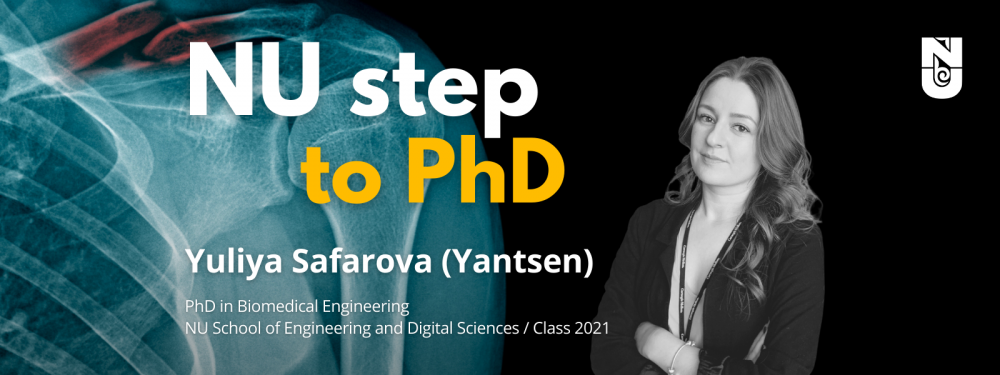NU Step to PhD: Yuliya Safarova (Yantsen), PhD in Biomedical Engineering
Our next NU Step to PhD rubric guest is Yuliya Safarova (Yantsen), NU SEDS graduate, PhD in Biomedical Engineering graduate. Yuliya is a Bolashak scholar (BSc in Biomedical Sciences, University of Auckland, New Zealand, 2011), who later graduated with the MA in Biology from the L.N. Gumilyov Eurasian National University in 2015. Currently, Yulia Safarova works as a research assistant at National Laboratory Astana, NU.
Tell us about your doctoral research?
My doctoral research was related to a new approach in cell therapy, namely the surface modification of the cell membrane to improve the delivery of cells to certain tissues. We have modified mesenchymal stem cells with an osteophilic polymer for targeted delivery of cells directly to bone tissue. This approach was used to accelerate the regeneration of bone tissue in fractures associated with osteoporosis, since the healing of osteoporosis-associated fractures is much slower than usual fractures. As part of the project, we collaborated with the laboratory of my external supervisor, Professor Alan Russell of Carnegie Mellon University.
What is the applied value of your work?
The applied value lies in the use of cellular technologies in routine medical practice. However, in Kazakhstan, the concept of a biomedical cell product has not yet been introduced in legislation. Therefore, at the moment, the use of technology is not possible.
What can you tell us about the process of writing your thesis?
In Kazakhstan, Nazarbayev University is one of the best, and not only in terms of the equipment of laboratories for biomedical research, but also in terms of faculty qualifications. There were some leading scientists in their fields among our faculty, who are of highly-cited publications. Throughout the entire period of study, the director of the programme, Professor Luis Rojas, methodically and persistently guided and stimulated us on the way to defending the thesis. During my studies, I completed an internship at Carnegie Mellon University, and also presented the research results at the international conference ‘Biomaterials for Healthcare’ (Rome, Italy) in 2016, where I won first place for the best oral presentation among young scientists.
Please, tell us about your future plans?
I plan to continue my research, but in a new capacity as project manager. A PhD is a new level in a career that is associated with greater responsibility and workload. The degree allows you to become a leader of scientific projects. However, in addition to scientific laboratory work, this role also includes some bureaucracy and paperwork: filling out applications for grants, cooperation with international research institutes and laboratories, and so on.
What would you advise to future doctoral students?
One of the main pieces of advice I can give future doctoral students is ‘never stop and never despair’. It is necessary to clearly formulate your research hypothesis and methodically follow the plan. It is not an easy process, but in the end you will become a unique specialist in a very narrow field, which will present you with lots of opportunities to work in the leading laboratories around the world.


